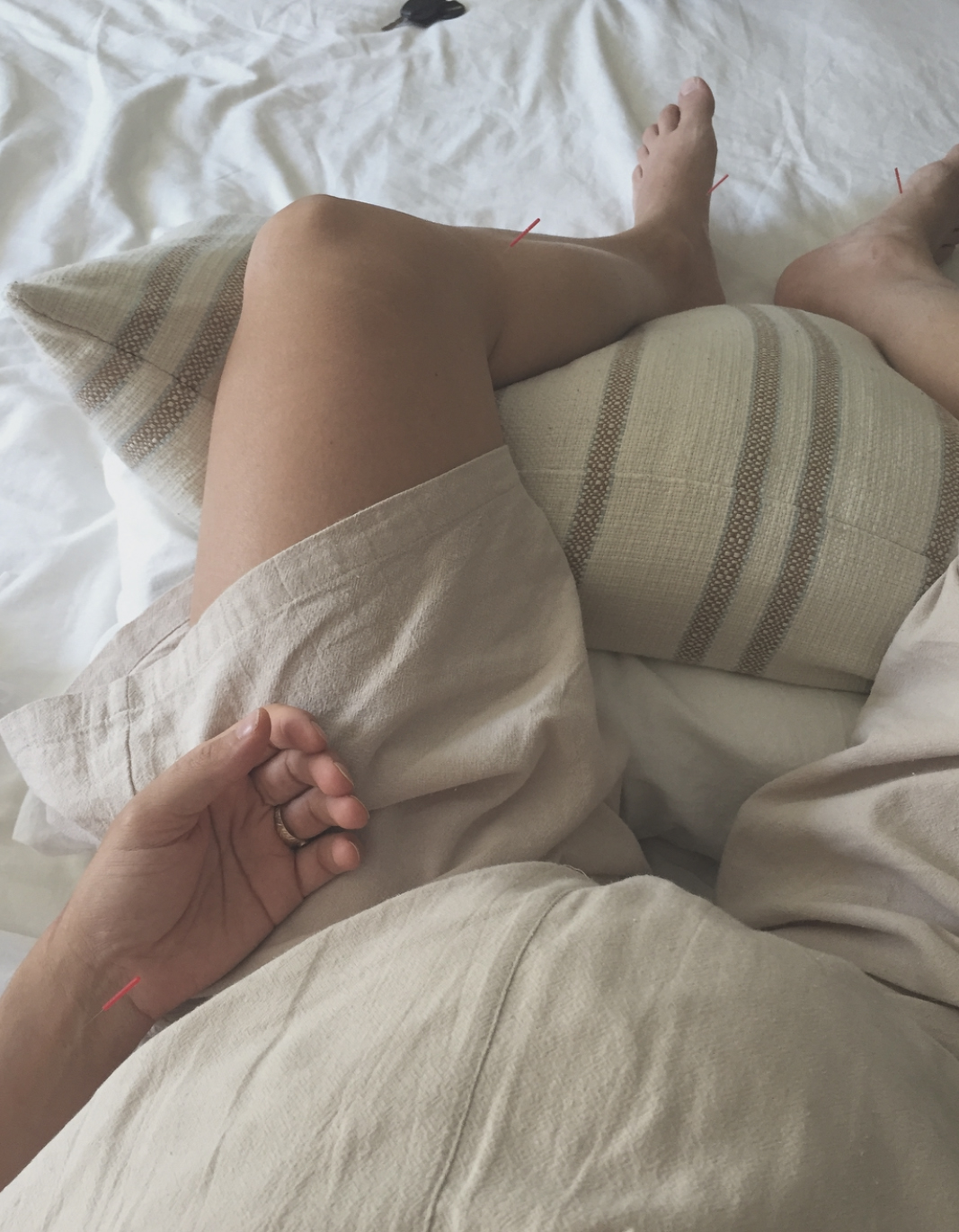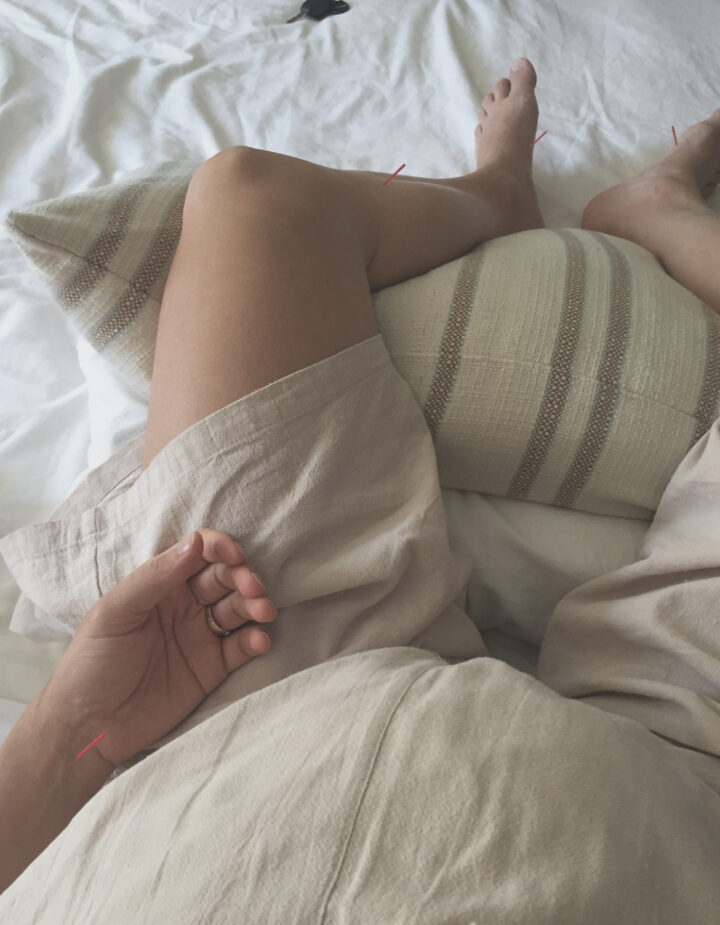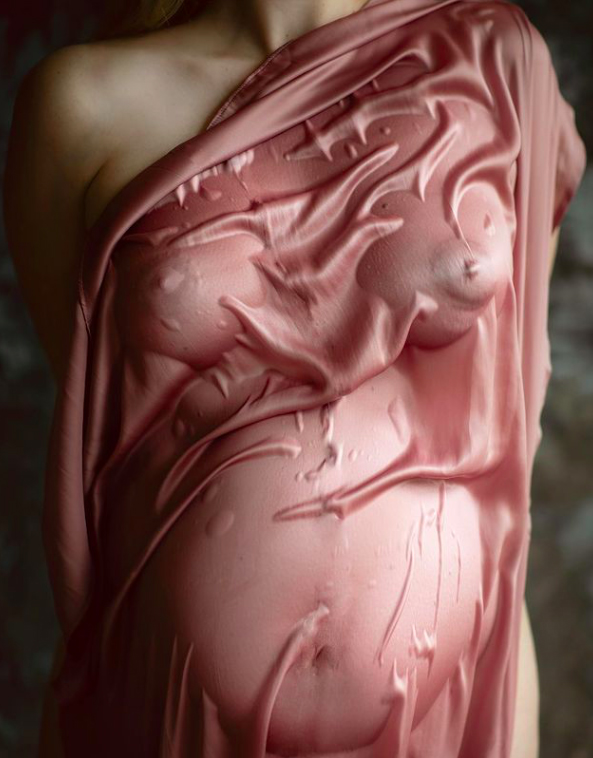When I was pregnant, the question “How are you feeling?” seemed so complex to answer. While I had a stellar care team, my acupuncturist was the only medical professional with whom I discussed every physical and emotional change I was going through.
Acupuncturists practice traditional East Asian Medicine. We view health through a holistic lens. University of Oxford research suggests that acupuncture may have been invented by Han Dynasty anatomists in ancient China (Shaw & McLennan, 2016). Translation: acupuncture is more firmly rooted in biomedical origins than its “woo-woo” reputation belies. And, it’s safe during pregnancy (Park et al., 2014).
Dr. Ardem Patapoutian, winner of the 2021 Nobel Prize in Physiology and Medicine, identified receptors for touch called Piezo1 and Piezo2, after the Greek word “pressure” (The Nobel Foundation, 2021). These receptors are responsible for proprioception, aka our perception and awareness of our body in space.
At its core, acupuncture is proprioceptive. Any kind of touch, including inserting fine needles in specific points on the body, activates our Piezo channels. This sensory information travels directly to the brain, eliciting heightened cerebellar awareness. This signals the body to promote circulation and direct electrical activity to areas of pain, illness, or injury in order to regain homeostasis.
Whether you’ve been deemed a high risk pregnancy or just need a holistic perspective, here are 9 signs to seek an acupuncturist as part of your prenatal care team:
1. You’re constantly nauseous and fatigued
We all expect some morning sickness, but when you can’t even drink water it’s a rough day. Acupuncture has long been established to safely and effectively treat nausea and fatigue. A meta-analysis covering 1043 cases of hyperemesis gravidarum showed significant improvement rates in nausea and vomiting as well as ability to intake food (Lu et al., 2021). You can have your cake and *keep it down* too.
2. You’re constipated
Isn’t pregnancy uncomfortable enough without not being able to poop too? Besides treating you in the office, your acupuncturist can teach you acupressure points to relieve constipation. A randomized controlled trial of 120 pregnant women found that self-administered acupressure decreased constipation severity significantly compared with the control group (Kirca & Kanza 2021).
3. You feel stressed, anxious, or depressed
You can be excited to meet the Babe AND be stressed, anxious or depressed at the same time. Every parent-to-be can benefit from extra support. A randomized controlled trial administered acupuncture to 52 pregnant women who met DSM criteria for major depressive disorder. The individuals who received acupuncture points specifically indicated for depression reported a greater decrease in symptoms compared with the control groups (Manber et al., 2010).
4. Your back and hips hurt
Low back and/or pelvic pain (LBPP) can be debilitating during pregnancy. A meta-analysis of randomized controlled trials examining 1,040 women total found that acupuncture significantly relieved low back and pelvic pain during pregnancy. It also improved the ability to function in common daily activities. Study participants overall experienced increased quality of life during pregnancy AND their newborns later experienced zero birth complications (Yang et al., 2022). A win for both mom and baby!
5. Your rings or shoes don’t fit
If you’re noticing swelling and holding onto increased fluid, acupuncture can safely reduce water retention. Plus, emerging studies examine acupuncture’s effect on more severe causes of edema. A pilot study of pregnant women diagnosed with preeclampsia found that acupuncture combined with typical pharmaceutical treatments was associated with a greater reduction in blood pressure than conventional care alone (Zeng et al., 2015). The research for integrative care is promising, especially since preeclampsia and HELLP syndrome are high-risk situations (Kocher & Hobbs, 2019).
6. You’ve been diagnosed with gestational diabetes
I felt so seen when my acupuncturist gently suggested that my gestational diabetes might be correlated with the emotional stress and anxiety I was experiencing during my pregnancy (OuYang et al., 2021).
The placenta produces hormones – including cortisol (an important stress hormone) – during pregnancy. Cortisol plays a critical role in hyperglycemia and fetal development (Nguyen et al., 2023). Cortisol also has a blocking effect on insulin. When the pancreas does not produce enough insulin to counteract rising placental hormones, gestational diabetes occurs (Johns Hopkins Medicine, 2023).
A study of 1426 women concluded that experiencing anxiety in early pregnancy increases the risk of developing gestational diabetes mellitus (Tang et al., 2020). Though further research is needed for acupuncture’s effect on gestational diabetes specifically, a randomized placebo controlled trial found acupuncture to be effective at reducing blood glucose levels in Type II diabetes patients (Mooventhan et al., 2020).
7. You dilated early and are spotting
At 30 weeks gestation, I looked down to see my underwear covered in blood. I have never been more scared. My midwife discovered that I was already one centimeter dilated. I visited my acupuncturist (for the first time during my pregnancy) afterwards and she inserted needles at specific points to prevent preterm labor. With her continued support, I made it to 37 weeks + 4 days and delivered a healthy baby girl. Traditional Chinese Medicine can also be a complementary treatment option for those at risk of miscarriage (Betts et al., 2012).
8. Your baby is in breech position
A 2021 systematic review found that acupuncture and moxibustion (burning the herb mugwort) around a specific acupuncture point on the little toe gently increased the frequency of correcting non-vertex (breech) presentations at birth. Interestingly, this intervention was found to be more effective in the Asian population than in the non-Asian population. Another study involving 93 pregnant women resulted in a 62% success rate in turning a breech position fetus when acupuncture and moxibustion was administered between 32-35 weeks gestation (Brici et al., 2019). Whether you deliver via C-section or vaginally, a healthy baby is the most important outcome at the end of the day.
9. You want a holistic perspective on pregnancy and postpartum
OB/GYN doctors, nurses, midwives, and doulas are my literal heroes. If you’re also seeking an Eastern medicine lens, an acupuncturist can fill in any gaps. Being equipped with additional self-assessment tools to reflect on during your pregnancy journey is invaluable. Your acupuncturist can provide lifestyle recommendations, diet modifications, and may even prescribe physical corrective strategies to relieve discomfort. If they are also a licensed herbalist, they can prescribe you nourishing herbal tonics to boost postpartum recovery. Because you deserve it, mama.
This is not medical advice. Please consult your OB/GYN provider before seeking acupuncture treatment during pregnancy. Ensure your acupuncturist is board-certified through the National Certification Commission for Acupuncture and Oriental Medicine (NCCAOM).
Sarah Lu-Otero L.Ac, Dipl.OM, MSW, is a Licensed Acupuncturist and Board-Certified Herbalist.
Sarah practices traditional East Asian medicine through a modern lens. Her focus areas include pain and injury rehabilitation, pregnancy and postpartum health, as well as sleep and stress management. She incorporates movement assessment and prescribes corrective rehabilitative strategies. Sarah also creates bespoke herbal formulas.
Sarah earned her Master’s of Science in Traditional Oriental Medicine from Pacific College of Health and Science. She is currently pursuing her clinical doctorate. She also holds a Master’s in Social Work from Columbia University.
Sarah practices in New York City and Long Island. She is a new mom to a baby girl. You can follow her on Instagram at @yunmedicine.
REFERENCES
Shaw, V., McLennan, A. (2016). Was acupuncture developed by Han Dynasty anatomists? The Anatomical Record, 299, 643-659.
Park J., Sohn Y., White A., & Lee H. (2014). The safety of acupuncture during pregnancy: a systematic review. Acupuncture in Medicine, 32(3), 257-266.
The Nobel Foundation. (2021, Oct 4). Press Release: The Nobel Prize in Physiology or Medicine 2021. The Nobel Prize.
Lewis, Tanya. (2021, Oct 8). 2021 Nobel Prize Winner Explains the Importance of Sensing Touch. Scientific American.
https://www.scientificamerican.com/article/2021-medicine-nobel-prize-winner-explains-t he-importance-of-sensing-touch/
Lu H., Zheng C., Zhong Y., Cheng L., & Zhou Y. (2021). Effectiveness of Acupuncture in the Treatment of Hyperemesis Gravidarum: A Systematic Review and Meta-Analysis.
Evidence Based Complementary Alternative Medicine.
Kirca A., Kanza G. (2021) Effects of self-acupressure on pregnancy-related constipation: A single-blind randomized controlled study. Explore, 17(5), 463-468.
Manber R., Schnyer R., Lyell D., Chambers A., Caughey A., Druzin M., Carlyle E., Celio C., Gress J., Huang M., Kalista T., Martin-Okada R., & Allen J. (2010) Acupuncture for depression during pregnancy: a randomized controlled trial. Obstetrics & Gynecology, 115(3), 511-520. https://pubmed.ncbi.nlm.nih.gov/20177281/
Yang, J., Wang, Y., Xu, J., Ou, Z., Yue, T., Mao, Z., Ying, L., Wang, T., Shen, Z., & Dong, W. (2022). Acupuncture for low back and/or pelvic pain during pregnancy: a systematic review and meta-analysis of randomised controlled trials. BMJ Open.
Zeng, Y., Liu, B., Luo, T., Chen, Y., Chen, G., Chen, D. (2016). Effects of acupuncture on preeclampsia in Chinese women: a pilot prospective cohort study. Acupuncture Medicine, 34(2), 144-148. https://pubmed.ncbi.nlm.nih.gov/26516136/
Kocher Z, Hobbs V. (2019). Integrating Acupuncture for Preeclampsia with Severe Features and HELLP Syndrome in a High-Risk Antepartum Care Setting. Medical Acupuncture, 31(6), 407-415. https://www.ncbi.nlm.nih.gov/pmc/articles/PMC6918523/
Tang Y., Lan X., Zhang Y., Zhou, F., Cai, C., Zhang, J., Pang, X., Hao, L., Li, R., Zeng, G. (2020). Anxiety and depression on gestational diabetes mellitus in early pregnancy. Journal of Hygiene Research, 49(2), 179-184.
Johns Hopkins Medicine (2023). Gestational Diabetes Mellitus (GDM). Johns Hopkins Medicine.
https://www.hopkinsmedicine.org/health/conditions-and-diseases/diabetes/gestational-dia betes
Nguyen, T., Bui M., Trung, D., Dinh, L., Nguyen, P., Tran, T., Hien, T., Luong, C., Nguyen, H., Tuan, P., Tran, V., & Nguyen, X. (2023) Relationship Between Maternal Serum Cortisol and Maternal Insulin Resistance and Fetal Ultrasound Characteristics in Gestational Diabetes Mellitus. Diabetes, Metabolic Syndrome and Obesity, 16, 365-372. https://www.dovepress.com/relationship-between-maternal-serum-cortisol-and-maternal-i
nsulin-resi-peer-reviewed-fulltext-article-DMSO#:~:text=Several%20observational%20st udies%20in%20GDM%20have%20found%20elevated%20cortisol%20levels%20in%20 GDM.&text=Elevations%20of%20cortisol%20were%20detected,reduced%20insulin%20 sensitivity%20in%20GDM
OuYang, H., Chen, B., Abdulrahman, A., Li, L., & Wu, N. (2021). Associations between Gestational Diabetes and Anxiety or Depression: A Systematic Review. Journal of Diabetes Research, 2021. https://www.hindawi.com/journals/jdr/2021/9959779/
Mooventhan A., Ningombam R., & Nivethitha L. (2020). Effect of bilateral needling at an acupuncture point, ST-36 (Zusanli) on blood glucose levels in type 2 diabetes mellitus patients: A pilot randomized placebo controlled trial. Journal of Complementary & Integrative Medicine. 17(3). https://pubmed.ncbi.nlm.nih.gov/32406384/
Betts, D., Smith, C.. & Hannah, D. (2012). Acupuncture as a therapeutic treatment option for threatened miscarriage. BMC Complementary Alternative Medicine, 12(20) https://doi.org/10.1186/1472-6882-12-20
Liao, J., Shao, S., Chang, C., Chai, P., Owang, K., Huang, T, Yang, C., Lee, T., & Chen, Y. (2021) Correction of Breech Presentation with Moxibustion and Acupuncture: A Systematic Review and Meta-Analysis. Healthcare (Basel), 9(6), 619.
Brici, P., Franconi, G., Scatassa, C., Fabbri, E., & Assirelli, P. (2019) Turning Foetal Breech Presentation at 32-35 Weeks of Gestational Age by Acupuncture and Moxibustion. Evidence Based Complementary Alternative Medicine.




